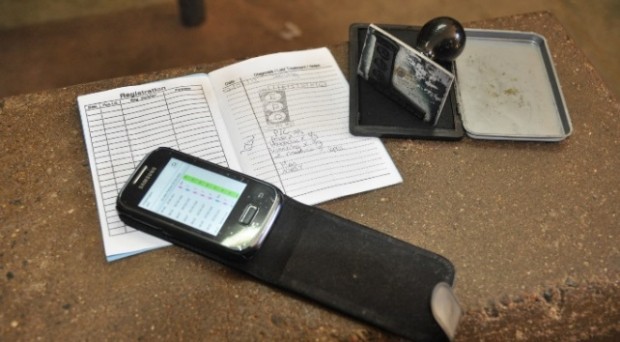
Forty one thousand children died before reaching their fifth birthday in Malawi in 2013. Over half of these deaths were caused by illnesses (sepsis, meningitis, pneumonia and diarrhoea) that are both preventable and treatable with early recognition and intervention.
In the absence of systematic triage at primary health level in Malawi, a common challenge is lack of early and accurate recognition of serious illness for urgent referral to hospital. Patients are seen on a first-come, first-served basis. Severe illnesses are regularly missed as hundreds of children queue for hours. Many do not survive the wait.
The launch of Action Meningitis
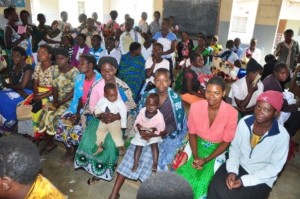
Action Meningitis launched in October 2012 and aims to tackle Malawi’s high infant mortality rate by introducing triage into primary clinics. Underpinned by ten years of clinical research and working closely with the Ministry of Health and other partners: the Malawi- Liverpool-Wellcome Trust, Queen Elizabeth Central Hospital and D-tree International, the project has successfully integrated an mHealth point-of-care triage system at primary level.
Using the WHO Emergency Triage Assessment and Treatment (ETAT) protocol, healthcare workers (health surveillance assistants) are enabled to detect vital signs of severe illness.
ETAT complements existing protocols and strengthens the overall healthcare system through improved prioritisation of care and resources. Children are given the attention and treatment they would otherwise miss due to overcrowding of clinics and lack of trained healthcare workers.
Introducing the mobile app for healthcare workers
One hundred and ninety two healthcare workers have been trained in the use of ETAT in eight clinics using the mHealth tool – a mobile phone. Through them triage was delivered to 220,000 children over two years.
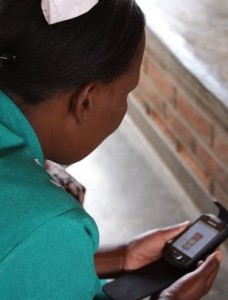
Patient flows in clinics have radically improved, enabling swifter treatment of sick children or referral to hospital. Qualitative and quantitative methods of data collection were used in baseline and end line studies to examine changes in clinic practice and knowledge among healthcare workers.
Quality of triage in all primary centres remained high (average 92.2 ±7.08% agreement with ETAT clinicians who re-examined the children). Frequent monitoring visits show there is good patient flow within clinics and that patients are being seen in order of priority.
Mobile phones are an important tool, ensuring that healthcare workers stick to protocol, acting as a prompt to identify severely ill children. Triage is quick on the phones, taking less than a minute to assess each child. On the few occasions when phones were unavailable (for example during use in training sessions), the healthcare workers still continued to apply the skills they had learnt and triage children in the queue without the phones.
Improving the clinic experience with mHealth
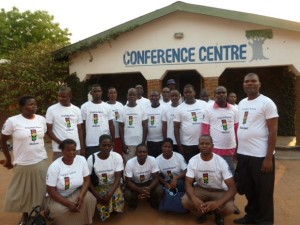
Clinic waiting times remain encouraging for introduction of a system that prioritises according to severity of illness. Time taken to be seen by the clinician was on average significantly shorter for emergencies (9 minutes) than priorities (28 minutes) and longest for queue cases (31 minutes).
mHealth triage protocols are now integrated into three rural Primary Health Centres and District Hospital child health systems (previously non-existent). Chikhwawa District is very different from busy urban Blantyre, reflected in numbers of children attending clinics: on average 94 and 395 were triaged weekly per clinic in Chikhwawa and Blantyre, respectively.
The future of mHealth
Better recognition, treatment, and referral of severely ill children at primary level is a key priority for reducing child mortality. The next step is to develop a scalable solution that can be adopted across the primary setting, and current partners are working closely with local, regional and national-level Ministry of Health to develop, refine, embed and extend the reach of the triage system.
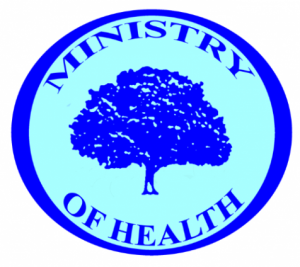
Chris Head, Chief Executive of Meningitis Research Foundation says:
“We are committed to working with our partners and the Ministry of Health in Malawi during the next three years to optimize the triage system so that it is fully appropriate for the primary level cadre staff, systems and resources (ETAT was originally designed and developed in Malawi for the tertiary setting).
Building on the success of the Chipatala Robot triage system we will expand further – training another 440 HCWs across 11 health centres, who will triage 384,000 children over the next three years. Our triaging system and the training we have provided to the health workers in Malawi means that seriously ill children are seen and treated sooner and we hope to save countless lives.”
Meningitis Research Foundation’s vision is a world free from meningitis and septicaemia. Their expertise has already helped save thousands of lives in the UK since it was formed in 1989 and they are now sharing that expertise in Malawi. Meningitis Research Foundation has invested £700k into research in Malawi since 2001.
Comments